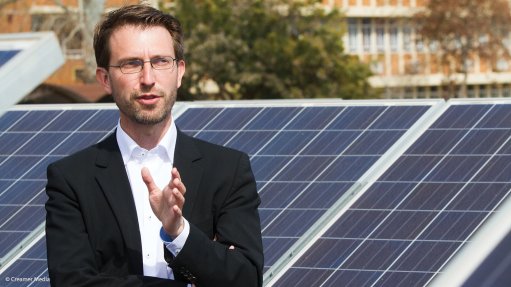
CSIR Energy Centre head Dr Tobias Bischof-Niemz
A study by the Council for Scientific and Industrial Research (CSIR) has revealed that South Africa could radically cut its energy costs if it aims for a 70% renewable-energy share by 2040.
CSIR Energy Centre head Dr Tobias Bischof-Niemz provided details of the study, titled ‘Least-cost electricity mix for South Africa by 2040’ at the yearly Windaba conference, in Cape Town, this week.
The study has considered two scenarios, namely a ‘business-as-usual’ approach, which is generally aligned with the Integrated Resources Plan of 2010 (IRP), and an updated demand forecast. The former scenario incurs large building costs from new coal and nuclear projects, as set out in Eskom’s briefing in October to Parliament’s Portfolio Committee on Energy.
The study’s ‘re-optimised’ scenario, meanwhile, looks at coal, nuclear, gas and renewable energy as supply options, with this scenario considering the least-cost option to meet energy and capacity requirements.
“The ‘re-optimised’ mix is almost R90-billion a year cheaper by 2040 than the ‘business-as-usual’ scenario,” says Bischof-Niemz, adding that, even if renewable energy was 50% more expensive than assumed, the ‘re-optimised’ option would still be cheaper than the ‘business-as-usual’ approach.
The study shows that the ‘re-optimised’ case would be almost 20c/kWh cheaper by 2040 than the ‘business-as-usual’ approach.
Wind and solar photovoltaic (PV) energy dominate the energy mix to 2040 in the ‘re-optimised’ scenario.
Actual solar PV, as well as wind tariffs, are currently well below the cost assumptions of the IRP, coming in at 62c/kWh, compared with baseload coal, which comes in at R1.03/kWh.
The cost of solar PV is expected to drop further, according to the CSIR analysis.
Assumptions based on the new-build cost puts nuclear at R1.17/kWh, combined cycle gas turbine power at R1.24/kWh, OCGT gas at R2.40/kWh, mid-merit coal at R1.51/kWh and diesel at R3.10/kWh.
The study shows that the ‘re-optimised’ mix would also reduce South Africa’s carbon dioxide (CO2) emissions by 60% compared to a ‘business-as-usual’ approach.
“Avoiding CO2 emissions and least-cost is not a trade-off anymore. South Africa can de-carbonise its electricity sector at negative carbon-avoidance cost,” the study says.
Water use would also be lower.
“[A combination of] solar PV, wind and natural gas is the cheapest new-build mix for the South African power system,” the study concludes.
Building out the required capacities by 2040 would provide a steady anchor offtake for a South African PV and wind manufacturing industry, says the study.